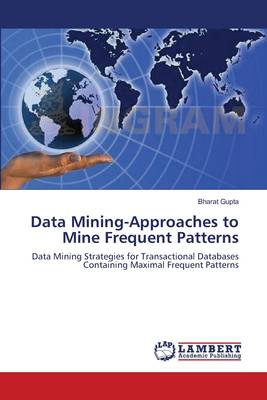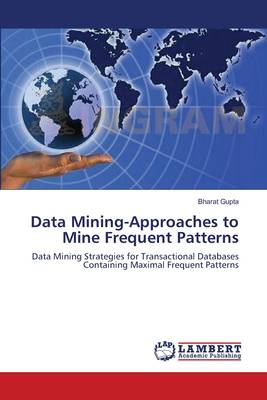
- Afhalen na 1 uur in een winkel met voorraad
- Gratis thuislevering in België vanaf € 30
- Ruim aanbod met 7 miljoen producten
- Afhalen na 1 uur in een winkel met voorraad
- Gratis thuislevering in België vanaf € 30
- Ruim aanbod met 7 miljoen producten
Zoeken
Data Mining-Approaches to Mine Frequent Patterns
Data Mining Strategies for Transactional Databases Containing Maximal Frequent Patterns
Bharat Gupta
Paperback | Engels
€ 57,95
+ 115 punten
Omschrijving
In data mining, Association rule mining becomes one of the important tasks of descriptive technique which can be defined as discovering meaningful patterns from large collection of data. Mining frequent itemset is very fundamental part of association rule mining. Many algorithms have been proposed from last many decades including horizontal layout based techniques, vertical layout based techniques, and projected layout based techniques. But most of the techniques suffer from repeated database scan, Candidate generation (Apriori Algorithms), memory consumption problem (FP-tree Algorithms) and many more for mining frequent patterns. As in retailer industry many transactional databases contain same set of transactions many times, to apply this thought, in this thesis present a new technique which is combination of present maximal Apriori (improved Apriori) and FP-tree techniques that guarantee the better performance than classical aprioi algorithm. Another aim is to study and analyze the various existing techniques for mining frequent itemsets and evaluate the performance of new techniques and compare with the existing classical Apriori and FP- tree algorithm.
Specificaties
Betrokkenen
- Auteur(s):
- Uitgeverij:
Inhoud
- Aantal bladzijden:
- 64
- Taal:
- Engels
Eigenschappen
- Productcode (EAN):
- 9783659110320
- Verschijningsdatum:
- 26/04/2012
- Uitvoering:
- Paperback
- Afmetingen:
- 152 mm x 220 mm
- Gewicht:
- 104 g

Alleen bij Standaard Boekhandel
+ 115 punten op je klantenkaart van Standaard Boekhandel
Beoordelingen
We publiceren alleen reviews die voldoen aan de voorwaarden voor reviews. Bekijk onze voorwaarden voor reviews.







